Featured
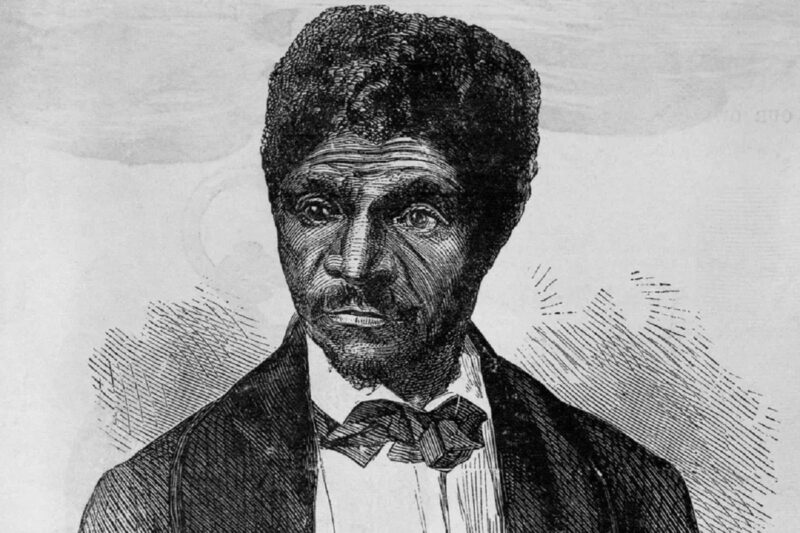 The case against the Supreme Court of the United States. By Ian Millhiser / Vox
The case against the Supreme Court of the United States. By Ian Millhiser / Vox
The Court was the midwife of Jim Crow, the right hand of union busters, the dead hand of the Confederacy, and now is one of the chief architects of America’s democratic decline. Dred Scott, whom the Supreme Court of the United States described as a being “of an inferior order.” Getty Images
The Court’s Republican majority hasn’t simply handed the Republican Party substantive policy victories. It is systematically dismantling voting rights protections that make it possible for every voter to have an equal voice, and for every political party to compete fairly for control of the United States government. Alito, the author of the opinion overturning Roe, is also the author of two important decisions dismantling much of the Voting Rights Act.
This behavior is consistent with the history of an institution that once blessed slavery and described Black people as “beings of an inferior order.” It is consistent with the Court’s history of union-busting, of supporting racial segregation, and of upholding concentration camps. Read more
Related: America Is Growing Apart, Possibly for Good. By Ronald Brownstein / The Atlantic
Abortion
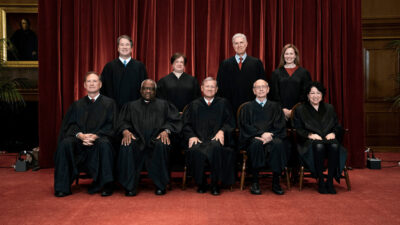 The Supreme Court Took the Most Extreme Course Possible. By Elie Mystal / The Nation
The Supreme Court Took the Most Extreme Course Possible. By Elie Mystal / The Nation
In overturning Roe v. Wade, the conservative majority embraced a vision of the United States as a country by and for white men.
The majority opinion, written by Samuel Alito and largely conforming to the draft of this opinion leaked a month ago, is the most extreme version of this ruling possible. The issue at the heart of the case was a ban in Mississippi on abortions after 15 weeks of gestation. That ban was intended, clearly and directly, to frustrate the work of Jackson Women’s Health (the only abortion clinic in the state of Mississippi), which provided abortions up to 16 weeks. The conservative majority could have simply upheld the 15-week ban. Instead, it chose to tear down the whole constitutional edifice making abortion legal and revoke the right to bodily autonomy. Read more
Related: What Doctors Want You To Know About Abortion Right Now. By Julia Riles / HuffPost
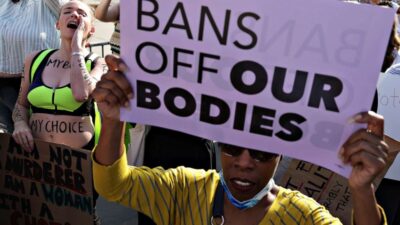 Why abortion restrictions disproportionately impact people of color. By Kiara Alfonseca / ABC News
Why abortion restrictions disproportionately impact people of color. By Kiara Alfonseca / ABC News
Black and Hispanic women have the highest abortion rates, the CDC reports.
Activists who work in Black and brown communities fear the socioeconomic effects of this decision. Abortion rights, they say, are an economic and health justice issue. Abortion rights advocates also say there are several factors that may go into a person’s decision to seek an abortion, including health care access and quality, financial support and willingness to be pregnant. In the most recent data from the CDC in 2019, Black women had the highest rate of abortions with 23.8 abortions per 1,000 women. Read more
Related: Black Maternal Mortality Is Still a Crisis. By Jessica Grose / NYT
 The Radical Reign of Clarence Thomas. By Maureen Dowd / NYT
The Radical Reign of Clarence Thomas. By Maureen Dowd / NYT
I was covering the first President Bush’s nomination of a 43-year-old U.S. appeals court judge for the D.C. Circuit to take the seat of retiring Justice Thurgood Marshall. Clarence Thomas, standing in front of a weather-beaten shingled cottage, looked uneasy as Bush defended his conservative choice. The warnings were clear even then. Democratic Senator Howard Metzenbaum of Ohio threatened to investigate Judge Thomas’s record on abortion, saying, “I will not support yet another Reagan-Bush Supreme Court nominee who remains silent on a woman’s right to choose and then ascends to the court to weaken that right.” Read more
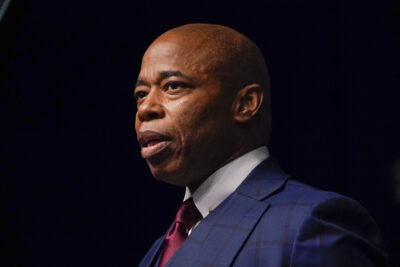 Adams says he wouldn’t be New York mayor if not for past partner’s abortion. By Amanda Eisenberg and Julian Shen-Berro / Politico
Adams says he wouldn’t be New York mayor if not for past partner’s abortion. By Amanda Eisenberg and Julian Shen-Berro / Politico
Mayor Eric Adams said Friday he wouldn’t be mayor if his former partner hadn’t gotten an abortion when they were teenagers. The revelation came after Adams, flanked by dozens of members of his administration on the steps of City Hall, announced new initiatives to improve abortion access in response to the U.S. Supreme Court’s unraveling of Roe v. Wade. “I was 15, and I just got home from being arrested, and [my partner] came to me. She said, ‘Eric, I’m pregnant, and look at your life,’” recalled the mayor, who has said his arrest and beating at the hands of police inspired him to later spend 22 years as an NYPD cop. Read more
Political / Social
 Jan. 6 Has Surfaced America’s Disdain for Democracy. By Ezra Klein Show / NYT podcast
Jan. 6 Has Surfaced America’s Disdain for Democracy. By Ezra Klein Show / NYT podcast
Jamelle Bouie explores what the Jan 6 hearings reveal about America’s political project.
The Jan. 6 hearings have made it clear that Donald Trump led a concerted, months long effort to overturn a democratic election. The extensive interviews — over 1,000 — that the House select committee conducted prove that Trump was told there was no evidence of election fraud, but he pressed his anti-democratic case regardless. And it appears that the hearings may be making an impact on public opinion: An ABC News/Ipsos survey released Sunday found that 58 percent of respondents believe Trump should be charged with a crime for his role in the Jan. 6 attack, up from 52 percent in April. We discuss why Jan. 6 may be not just an insurrection but “a kind of revolution or, at least, the very beginning of one”; how the anti-democratic nature of the American Constitution makes our system vulnerable to demagogues like Trump Listen here
Related: The Case for Prosecuting Trump. The Editorial Board / The Boston Globe
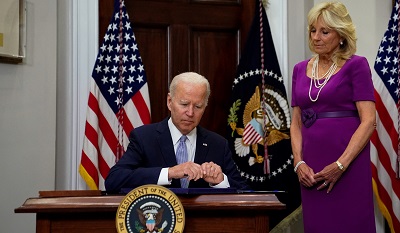 Biden signs bipartisan gun safety bill into law: ‘God willing, it’s going to save a lot of lives.’ By Donald Judd / CNN
Biden signs bipartisan gun safety bill into law: ‘God willing, it’s going to save a lot of lives.’ By Donald Judd / CNN
President Joe Biden on Saturday signed into law the first major federal gun safety legislation passed in decades, marking a significant bipartisan breakthrough on one of the most contentious policy issues in Washington. The package represents the most significant new federal legislation to address gun violence since the expired 10-year assault weapons ban of 1994 – though it fails to ban any weapons and falls far short of what Biden and his party had advocated for, and polls show most Americans want to see. Read more
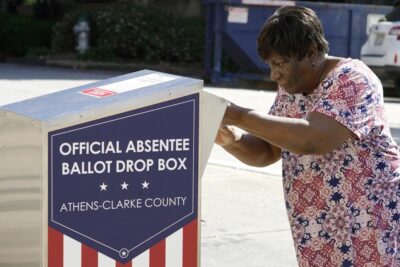 NAACP to partner with Vote.org to boost Black voter turnout in midterms. By
NAACP to partner with Vote.org to boost Black voter turnout in midterms. By
The organizations said in exclusive interviews that NAACP chapters will be trained in using the site to register voters ahead of the November elections.
The partnership will include training NAACP volunteers in the digital tools offered by Vote.org, a nonpartisan get-out-the-vote platform. NAACP President Derrick Johnson said engaging voters is “essential” for both the organization and the U.S., in light of what he called “direct attacks” on American democracy. “There will be special emphasis in targeted states, because the barriers to access and capital effectiveness has been high,” Johnson said. “But overall, we want individuals to be involved, engaged. We want to increase the number of people who are voting and not allow those seeking to limit access to voting to succeed.” Read more
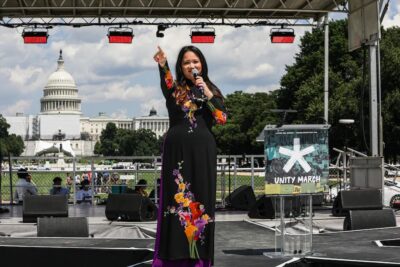 Asian American groups rally for racial and social equality. By Gaya Gupta / Wash Post
Asian American groups rally for racial and social equality. By Gaya Gupta / Wash Post
The rally comes days after the 40th anniversary of the murder of Vincent Chin, whose death spurred a movement for civil rights among Asian Americans
Paul Igasaki, his wife, Louann Igasaki, and their friends, Shobha Srinivasan and Deeana Jang, have for decades demonstrated for a host of issues affecting Asian Americans. What’s different about today’s landscape, they agreed, is that there’s a lot more diversity — both in the Asian American communities that have banded together and in the issues for which they advocate. The rally, held a day after the Supreme Court overturned Roe v. Wade, also focused on unifying the Asian American community and other underrepresented communities, with speakers noting how the court’s decision would disproportionately affect people of color. Read more
Ethics / Morality / Religion
 Abortion and bioethics: Principles to guide U.S. abortion debates. By Namcy S. Jecker / The Conversation
Abortion and bioethics: Principles to guide U.S. abortion debates. By Namcy S. Jecker / The Conversation
For decades, rancorous debate about the ruling has often been dominated by politics. Ethics garners less attention, although it lies at the heart of the legal controversy. As a philosopher and bioethicist, I study moral problems in medicine and health policy, including abortion. Bioethical approaches to abortion often appeal to four principles: respect patients’ autonomy; nonmaleficence, or “do no harm”; beneficence, or provide beneficial care; and justice. These principles were first developed during the 1970s to guide research involving human subjects. Today, they are essential guides for many doctors and ethicists in challenging medical cases. Read more
 Know Your Enemy: Overturning Roe, Part Two, on the Christian Right. By Matthew Sitman and Sam Adler-Bell / Dissent
Know Your Enemy: Overturning Roe, Part Two, on the Christian Right. By Matthew Sitman and Sam Adler-Bell / Dissent
Matt and Sam dive into the origins of the Christian right—a complicated tale often flattened by contemporary debates. What was the history of Christian anti-abortion activism before Roe, and how soon after the landmark Supreme Court decision did conservative Christians coalesce around abortion—and other issues—to become the political force we know today? What did it take to get Catholics and evangelicals to join forces, and what were the barriers to them coming together, especially given the history of anti-Catholicism in the United States? And how did all this help reshape the GOP into a vehicle for anti-abortion politics—a scenario that was not fated on the eve of Roe? Your hosts take up these questions and more, stopping in the early 1990s, when they’ll pick up the story in the third and final episode in the series. Listen here
 ‘Blessing of Elders’ lauds 7 Black Christian luminaries at Museum of the Bible gala. By Adelle M. Banks / RNS
‘Blessing of Elders’ lauds 7 Black Christian luminaries at Museum of the Bible gala. By Adelle M. Banks / RNS
‘I believe the 21st century will see the Black church lead the way to hope and healing in a deeply divided nation,’ said the Rev. A.R. Bernard.
Well-known names from the world of gospel music and the Black church gathered at the Museum of the Bible to hail the contributions of African American churches and to call for continued efforts toward building unity and bridging divides. The “Blessing of the Elders,” an awards celebration held Thursday (June 23) just blocks from the U.S. Capitol, specifically honored seven leaders known for their contributions in megachurches, denominational leadership, civil rights, music and religious broadcasting. Read more
Historical / Cultural
 James Farmer and the Roots of a Black Activist-Intellectual. By M. Keith Claybrook Jr. / AAIHS
James Farmer and the Roots of a Black Activist-Intellectual. By M. Keith Claybrook Jr. / AAIHS
Whitney Young, James Farmer, and Lee White at White House Civil Rights meeting
James Farmer conceptualized and developed a nonviolent direct-action philosophy that could be applied in the United States. He drew inspiration from Mohandas Karamchand Gandhi (Mahatma Gandhi) and the Indian Independence Movement. As a Pacificist and a Norman Thomas socialist, Farmer would reimagine nonviolent direct-action in the United States to address Jim Crow. Thirteen years before the Montgomery Bus Boycott, Farmer founded the Congress of Racial Equality (CORE) in 1942. Read more
 Patsy Mink, 1st woman of color elected to Congress, honored with portrait on Capitol Hill. By Lalee Ibssa / ABC News
Patsy Mink, 1st woman of color elected to Congress, honored with portrait on Capitol Hill. By Lalee Ibssa / ABC News
Rep. Mink was key in ensuring Title IX, signed 50 years ago, became law.
Rep. Patsy Mink, D-Hawaii, the first woman of color elected to Congress, now has a portrait to honor her legacy at the U.S. Capitol. A painting of the late congresswoman was unveiled in Statuary Hall Thursday in a ceremony celebrating her trailblazing efforts in the fight against sexual discrimination in sports and education. Read more
 The National Park Service aims to increase African-American sites. By John Burnett / NPR
The National Park Service aims to increase African-American sites. By John Burnett / NPR
Fredrika Newton stands next the bust of her late husband, Black Panther co-founder Huey P. Newton. NPS is considering a Black Panther Party National Historical Park.
There are currently about 40 sites in the park system referred to as “African-American experience sites.” These include the Brown v. Board of Education National Historical Park in Kansas, the Little Rock Central High School National Historic Site in Arkansas, the Birmingham Civil Rights National Monument in Alabama, the Selma to Montgomery National Historic Trail, and the Medgar and Myrlie Evers Home National Monument in Jackson, Miss. That’s the house where the NAACP’s state field secretary was murdered in 1963. Read more
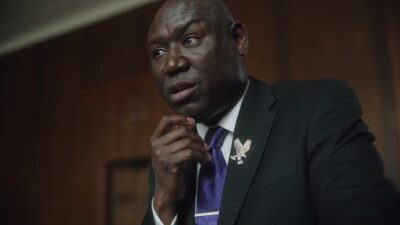 ‘Civil: Ben Crump’ Review: Netflix Documentary Chronicles Ben Crump’s Life. By Valerie Complex / Deadline
‘Civil: Ben Crump’ Review: Netflix Documentary Chronicles Ben Crump’s Life. By Valerie Complex / Deadline
The film, which premiered at the Tribeca Festival and opened the American Black Film Festival on Wednesday, begins with Crump in the shadows. He’s on a call from one of Floyd’s family members, who is begging for his help. This is the lawyer’s life daily, on the phone, traveling, organizing and talking to families while maintaining his personal life. From his hero Thurgood Marshall, Crump learned to always argue for justice and never keep quiet when facing injustice. Many argue about his sincerity. Is he doing this for the good of the people? Or for superficial reasons? The film premieres Sunday, Juneteenth, on Netflix. Read more
 Exploring the long history of Black music and the White House. By Denise Oliver Velez / Daily Kos
Exploring the long history of Black music and the White House. By Denise Oliver Velez / Daily Kos
Black music, its history, its composers, and its musicians cross almost every musical genre and are lauded and played across the globe by people of all races, ethnicities, and nationalities. There’s no wonder why it has often been part and parcel of the political life of this nation and welcomed into the hallowed halls of the White House. As Black Music Appreciation Month comes to a close, it’s fitting to spend this last #BlackMusicSunday in June exploring it. Let’s dive into its genesis and the historical connection between U.S. presidents and the music that is one of America’s greatest offerings to the globe. President Jimmy Carter first designated June as Black Music Month in 1979, and it’s been proclaimed by the White House each year since then. Though the name has shifted over the years, the subject has remained the same. Read more
 House music had its Black roots ripped up – now Drake and Beyoncé are reclaiming the. By Michelle Kambasha / The Guardian
House music had its Black roots ripped up – now Drake and Beyoncé are reclaiming the. By Michelle Kambasha / The Guardian
The world’s biggest Black stars have turned to the genre not to pander to white tastes – but to remind fans where it came from
House music was born out of Chicago’s predominantly Black nightlife scene, with the godfather of house, Frankie Knuckles, pioneering the distinctive sound. The origins of techno, too, can be traced to Black Detroit and there are still prominent electronic Black DJs in the field, such as Honey Dijon, Jayda G and Seth Troxler, even if the majority now form part of an underground movement catering to music lovers in the know. Read more
 Florida A&M Marching 100 delivers electrifying performance during Louis Vuitton Fashion Show. Jacqueline Laurean Yates / GMA
Florida A&M Marching 100 delivers electrifying performance during Louis Vuitton Fashion Show. Jacqueline Laurean Yates / GMA
Louis Vuitton’s men’s spring-summer 2023 fashion show was full of electrifying moments, and the monumental presence of Florida A&M University’s Marching 100 was one of them. The iconic band from FAMU — a historically Black college and university — charged onto the vibrant runway wearing the school’s signature green and orange while playing jubilant tunes by means of bellowing drums, trumpets and more instruments. Located at Paris’ famed Carré du Louvre, the fashion house transformed the venue into a supersized toy racetrack that featured rich neon hues, a yellow brick road-like runway and huge Louis Vuitton logo-printed red balloons. Watch here
Sports
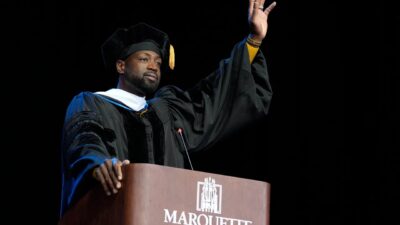 Dwayne Wade Receives Honorary Degree from Marquette University. By Arrman Kyaw / Diverse Issues in Higher Education
Dwayne Wade Receives Honorary Degree from Marquette University. By Arrman Kyaw / Diverse Issues in Higher Education
Basketball star Dwayne Wade received an honorary doctor of humane letters degree from Marquette University and was its commencement speaker this year, the Milwaukee Journal Sentinel reported.Wade attended the Milwaukee school from 2000-2003, leaving for the NBA draft. Speaking to 1,942 undergrads, Wade discussed passion and self-awareness. Read more
 House passes resolution demanding Russia release Brittney Griner. By CBS News
House passes resolution demanding Russia release Brittney Griner. By CBS News
The U.S. House on Friday approved a bipartisan resolution calling for the release of WNBA star Brittney Griner, who has been detained in Russia since February. The resolution, introduced by Arizona Rep. Greg Stanton, calls on Russia to “immediately release” the 31-year-old Griner, and asks U.S. officials to “raise the case” of Griner’s release when communicating with Russia. Read more
 NFL Reportedly Wants “Indefinite” Deshaun Watson Suspension. By Keith Reed / The Root
NFL Reportedly Wants “Indefinite” Deshaun Watson Suspension. By Keith Reed / The Root
With a disciplinary hearing with the NFL looming next week, a new report says that the NFL wants to suspend Cleveland Browns quarterback Deshaun Watson indefinitely, a punishment that would mean he’d have to sit out at least a full season. Read more
 Black coaches can lead in college baseball … if afforded the opportunity. By Clinton Yates / Andscape
Black coaches can lead in college baseball … if afforded the opportunity. By Clinton Yates / Andscape
Georgetown head baseball coach Edwin Thompson won Big East Coach of the Year in his second season. Georgetown University Athletics
As it stands right now, you could count the number of Black head coaches in the NCAA on three hands. If you take a look at the Power 5 conferences (ACC, SEC, Big Ten, Big 12, Pac-12), you don’t need any hands to count them — because there are none. Of the 299 schools that will field baseball teams next season in the NCAA’s Division I, 12 of them will have Black head coaches. That’s two more than this year — a robust jump from 3.3% to a whopping 4%. If you add in assistant coaches and support staff, the situation is even more dire. Read more
 This Teen Has Already Broken Some of Usain Bolt’s Records. He’s Getting Faster. By Jere Longman / NYT
This Teen Has Already Broken Some of Usain Bolt’s Records. He’s Getting Faster. By Jere Longman / NYT
Erriyon Knighton, just out of high school, has already lowered Bolt’s world junior record in the 200 meters. “It’s almost like he’s a pogo stick,” Knighton’s coach said.
When Erriyon Knighton, a few months past his 18th birthday, became the fourth-fastest 200-meter runner in history on April 30, his fellow sprinter Michael Cherry tweeted in amazement, “That boy got algebra on Monday.” Knighton was still weeks away from graduating high school when he ran half a lap around the track in 19.49 seconds, lowering his own world junior record once held by Usain Bolt, at the L.S.U. Invitational in Baton Rouge, La. Read more
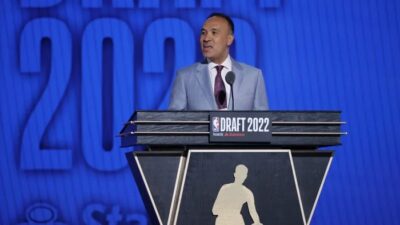 During his ascent in the NBA, deputy commissioner Mark Tatum was inspired to ‘dream big.’ By Marc J. Spears / Andscape
During his ascent in the NBA, deputy commissioner Mark Tatum was inspired to ‘dream big.’ By Marc J. Spears / Andscape
He’s proud of his Black and Asian heritage and his role in the NBA draft, which leads him back to his native Brooklyn
Hours before taking the stage at the NBA draft to announce the second-round picks on Thursday night, Mark Tatum took part in his annual tradition of taking the subway from near the NBA’s offices in Manhattan to the Atlantic Avenue-Barclays Center station – a return to his roots. Read more
Site Information
Articles appearing in the Digest are archived on our home page. And at the top of this page register your email to receive notification of new editions of Race Inquiry Digest.
Click here for earlier Digests. The site is searchable by name or topic. See “search” at the top of this page.
About Race Inquiry and Race Inquiry Digest. The Digest is published on Mondays and Thursdays.
Use the customized buttons below to share the Digest in an email, or post to your Facebook, Linkedin or Twitter accounts.